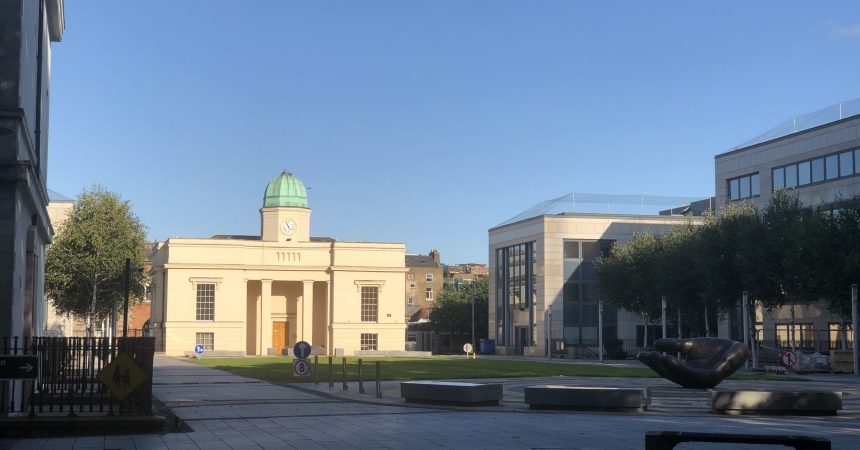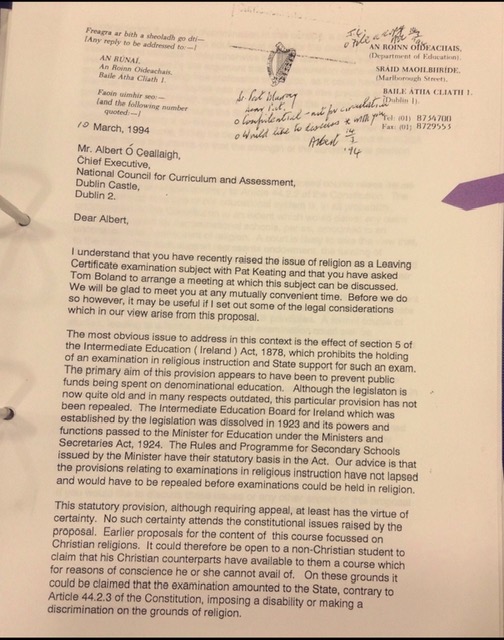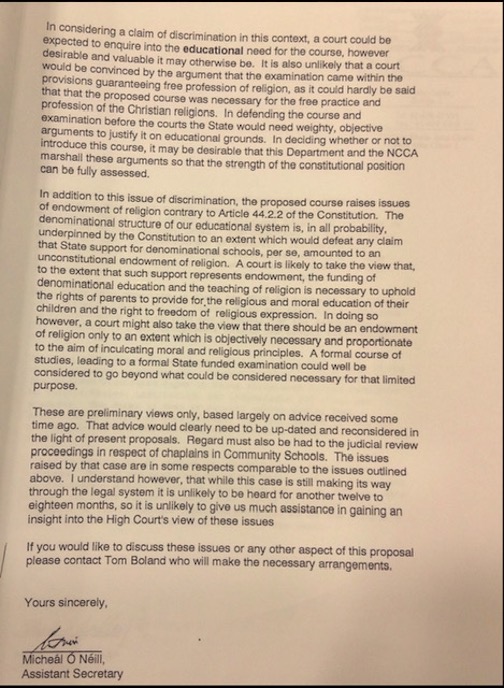
Parents, not schools, must decide whether their children attend religious education
Atheist Ireland has written to the Department of Education asking them to remove Circular Letter 0062/2018 in relation to Religious Education in ETB second level schools.
That Circular Letter states that there is no need for students to withdraw from curriculum Religious Education.
Given the Constitutional rights of parents, it is not up to the Department of Education to decide for parents whether any Religious Education course is suitable for their children.
Here is the letter we sent:
We are writing to ask you to withdraw Circular Letter 0062/218 as it is not in accordance with the Constitution and the findings of the Supreme Court.
The Department of Education cannot decide for parents what is or is not suitable for their children in relation to Religious Education or decide whether there is a need for parents to withdraw their children.
Circular Letter 0062/2018 states that:
“Religious Education, where it is offered by a school, must be delivered in the timetabled class periods without any religious instruction or worship of any religion forming any part of class activity. This means that any practice or material that would introduce religious instruction or worship cannot be used in the future. Religious Education will be subject to inspection including its delivery according to this circular. This clear separation of religious instruction from the NCCA Religious Education syllabus has the effect of ensuring that withdrawal does not arise for students studying the NCCA Religious Education syllabus where the school provides the subject as part of its normal range of subjects.”
Justice Barrington in the Supreme Court case Campaign to Separate Church and State v Minister for Education 1998 stated that:
“But the matter does not end there. Article 42 of the Constitution acknowledges that the primary and natural educator of the child is the family and guarantees to respect the inalienable right and duty of the parents to provide for the religious and moral, intellectual, physical and social education of their children. Article 42 S.2 prescribes that the parent shall be free to provide “this education” (i.e. religious moral intellectual physical and social education) in their homes or in private schools or “in schools recognised or established by the State”. In other words the Constitution contemplates children receiving religious education in schools recognised or established by the State but in accordance with the wishes of the parents.
It is in this context that one must read Article 44 “.2s.s.4 which prescribes that: Legislation providing State aid for schools shall not discriminate between schools under the management of different religious denominations, nor be such as to affect prejudicially the right of any child to attend a school receiving public money without attending religious instruction at that school.”(pages 25,26)
The Supreme Court found that the rights of parents in relation to the religious education of their children under Article 42.1 must be read in the context of Article 44.2.4 – the right to not attend religious instruction. The Department of Education has no right to decide for parents what is or is not suitable religious education for their children or whether there is the need for parents to withdraw their children from it.
In the recent Burke v Minister for Education case in March this year the Court of Appeal recognised the connection between Article 42.1 and Article 41 which obliges the State to protect the family in its authority. It’s simply not the function of the State to develop attitudes and values in children from atheist or secular families to enable them to come to an understanding of religion and its relevance to life, relationships, society and the wider world if that is against their conscience.
We appreciate that this case has been appealed to the Supreme Court but this particular point will not change regardless of the outcome. The Court of Appeal in the Burke Case stated that:
“Under Article 41.1.2 the State guarantees to protect the family, in its constitution and authority, as the necessary basis of social order and as indispensable to the welfare of the Nation and the State. As we have seen, the relevance of the family provisions was recognised by the Supreme Court in the case of In re Article 26 and School Attendance Bill, 1942. In DPP v. Best, Denham J. in her judgment, one of five delivered, stated that “(t)he distinct place of the family in Irish society is a factor to be weighed in all relevant decisions.” Two other judges of the Supreme Court either expressly agreed with her judgment or held that the relevant provisions of Article 42 must be read in the context of the special recognition granted to the family in Article 41.1.1.”
The Department of Education has simply no Constitutional authority to decide for parents what is or is not suitable religious education for their children. The right to not attend religious instruction must be read in the context of Article 42.1. The relevant provisions of Article 42 must be read in the context of the special recognition granted to the family in Article 41.1.1.
The main aim of the Religious Education course updated in 2019 is:
“Religious Education aims to develop knowledge, understanding, skills, attitudes and values to enable young people to come to an understanding of religion and its relevance to life, relationships, society and the wider world. It aims to develop the students’ ability to examine questions of meaning, purpose and relationships, to help students understand, respect and appreciate people’s expression of their beliefs, and to facilitate dialogue and reflection on the diversity of beliefs and values that inform responsible decision-making and ways of living.”
If the main aim of any curriculum course was to develop knowledge, understanding, skills, attitudes and values to enable young people to come to an understanding of atheism and its relevance to life, relationships, society and the wider world then it would be seen as breaching the rights of parents under Article 42.1 of the Constitution and Article 41.1.1. It would also be seen as discrimination forbidden by Article 44.2.3 of the Constitution.
The main aim of the Religious Education course introduced in the year 2000 to schools was to develop the moral and spiritual values of all children through religious education; it just acknowledged the non religious interpretation of life.
We do not see how any educational need can override the constitutional rights of parents in relation to the religious education of their children. The Constitution does not even oblige the State to ensure that all children receive a basic religious education, as that is the absolute right of parents (Article 42.3.2).
Constitutional issues around discrimination and endowment of religion under Article 44.2.2 and Article 44.2.3 were raised by the Department of Education long before a curriculum religious course was introduced to schools in 2000.
In a letter dated 1994 (attached) the Department of Education said that the State would need weighty, objective arguments to justify the course on educational grounds. At the time the Department of Education did not give any consideration to the constitutional rights of atheist and secular parents who also have Constitutional rights regarding the moral education of their children (Article 42.1 – Article Article 44.2.1) which are not based on a religious understanding of the world.
Given the Constitutional rights of parents in relation to the education of their children (Article 42.1) and the rights of families (Article 41.1.1) we simply cannot understand what weighty, objective arguments you had for developing understanding, skills, attitudes and values in our children to enable them to see the relevance of religion to life, relationships, society and the wider world when we object on conscientious grounds to that aim. Nor can we understand why the Department claims that withdrawal from the course does not arise.
We look forward to hearing from you.
Attached below: Letter from Department to NCCA, 1994.









0 Comments
No comments!
There are no comments yet, but you can be first to comment this article.